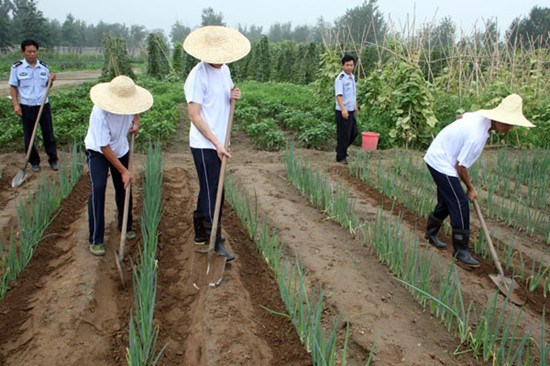
Recovering drug addicts do manual work at Zhiyuan rehabilitation center in Beijing's Shunyi district in July 2010. The center helps former addicts learn a trade or a skill that will enable them to make a living. Zhang Yujun / for China Daily
It has been a long time since recovering heroin addict Zhang Lin has felt part of a community. A user since 1998, he has spent the last decade in and out of State-run rehab centers.
His ongoing battle with drugs has cost him his marriage and most of his friends.
"Last year, at Chinese New Year, I was desperate and alone. I felt forgotten," the 53 years old said, recalling the time after his last stint at the Beijing Drug Rehabilitation Center.
But things have changed, he said, thanks largely to the Sunflower Community project.
Jointly run by the public security bureau in Beijing's Dongcheng district and residential committees, the pilot program aims to reduce relapses among reformed addicts through community supervision, as required in a 2008 revision of the Drug Control Law.
Roughly 100 people in Dongcheng district have joined the three-year program since June 2011. It is compulsory for addicts fresh out of rehab, but they must first sign agreements with community committees. Each receives access to social services and must pass regular urine tests — once a month for the first year, every three months for the second and every six months for the third.
So far no community has reported a positive test, according to the Dongcheng public security bureau.
Drug control officer Xing Tao, who regularly calls and visits addicts in the program to check on their progress, said the Sunflower Community program is ready to be rolled out across the capital.
"We don't have clear statistics on how many people re-offend after they are released from rehab centers, but we're certain that the program can ease the severity of the problem," he said.
Community care
Zhang, one of 10 recovering addicts supervised by the Andingmen community, signed up for the program in early 2012. Hao Shuhua, director of the residential committee of the community, said Zhang was unemployed at that time and lived on a monthly government allowance.
His wife had left him about five years earlier, and his young son had been sent to live with the child's mother, "so he was idle much of the time", Hao said. She began by encouraging him to find a job.
"Most drug users don't like sharing their stories and are seldom willing to talk about their difficulties," said Hao, who has six years' experience in community social work. "The first thing we need to do is win their trust and get them to open up."
Zhang's breakthrough came when Hao and her colleagues visited his father, who was gravely ill in a hospital. "He became more talkative after that, and he turned to me when he was in trouble," she said.
Zhang now runs a small booth selling pancakes.

Copyright ©1999-2011 Chinanews.com. All rights reserved.
Reproduction in whole or in part without permission is prohibited.